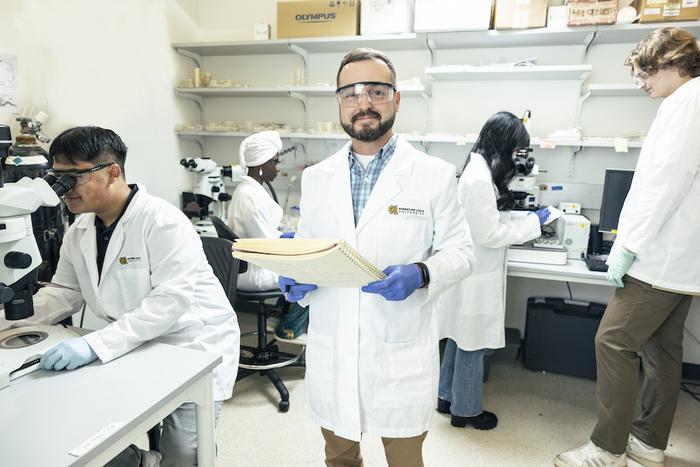Kennesaw State University biology professor Brandon Carpenter was inspired to pursue a career in science because of an undergraduate research experience. With a recent grant from the National Institutes of Health (NIH), he’ll provide a similar experience to his students.

Credit: Kennesaw State University
Kennesaw State University biology professor Brandon Carpenter was inspired to pursue a career in science because of an undergraduate research experience. With a recent grant from the National Institutes of Health (NIH), he’ll provide a similar experience to his students.
Carpenter, an assistant professor of cellular and molecular biology who studies neurodevelopmental disorders and genetic mutations, received a $432,000 grant to continue research that will help uncover the mechanisms that regulate inheritance of epigenetic states, or “cellular memories,” from one generation to the next. In doing so, his work will shed light on how cellular memories are inherited between generations, and what happens to normal development when those memories aren’t inherited properly.
“What got me into science, and what I’m really interested in, is inspiring undergraduates, bringing authentic research experiences into the lab for them,” he said. “This grant will give students the opportunity to do research and be prepared for the next step in their careers.”
Most of the money will go toward funding a group of undergraduate and graduate researchers in his lab, where they use a microscopic nematode, Caenorhabditis elegans (C. elegans), that shares half its genes with humans, to study the mechanisms that underlie neurological disorders. Due to the short life span and ease of manipulating nematodes, student researchers can easily execute experiments and generate publishable data, often within a single semester.
“We can take out a C. elegans gene and put in a human version of that gene and it can rescue that gene, and the worm can function very similarly to the way it did when it had its normal gene,” Carpenter said. “We are able to study basic mechanisms in the worm and it’s directly relevant to what’s happening in humans.”
He said the overall goal of his research is to study how inappropriate inheritance of epigenetic states affects normal tissue development and function. Because the enzymes that Carpenter studies that regulate epigenetic inheritance are conserved in humans, his work will provide insight into how medical professionals might intervene to treat patients with these disorders.
“By studying how these cellular memories turn on the wrong way and affect tissues, we can start to understand the mechanisms of how these patients that have mutations in these same enzymes that regulate the cellular memory have the phenotypes they do,” he said.
Carpenter said he hopes to open his laboratory and research to more students, offering similar research experiences to the ones that directed him toward his career as a professor and researcher.
“When you can support a student financially so they can show up in your lab and get paid, it helps alleviate other things in life that they’re dealing with, and it broadens the net of different types of students with different life situations that can participate in research experiences,” he said.




